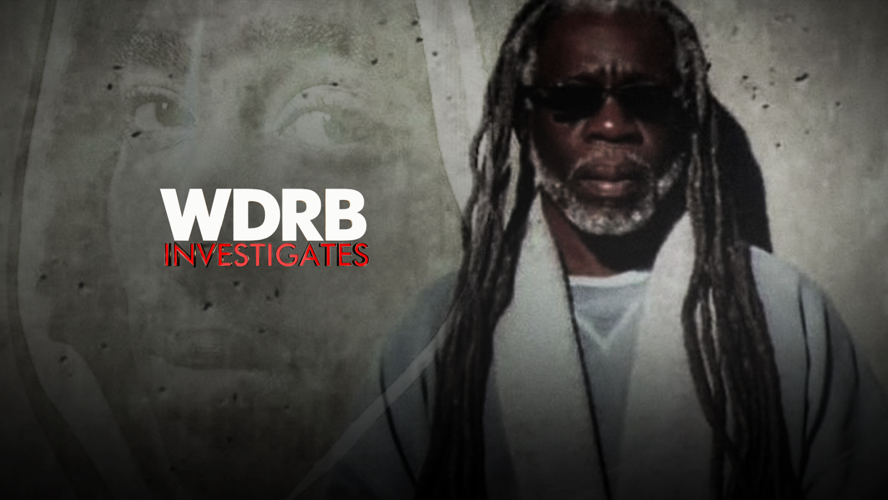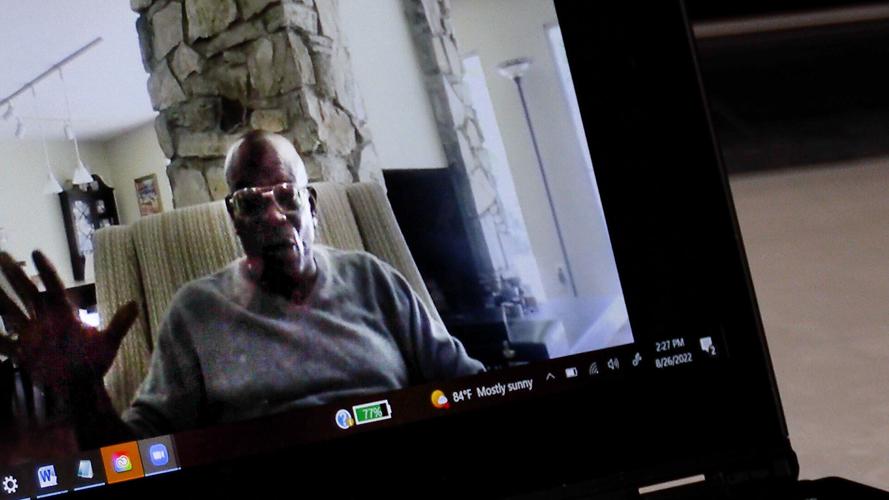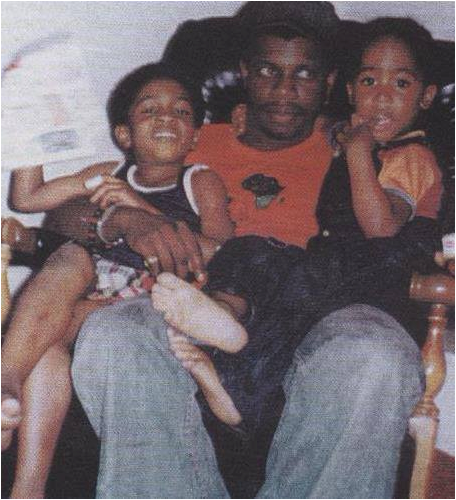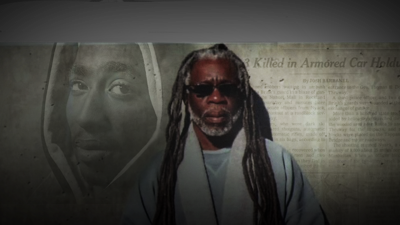LOUISVILLE, Ky. (WDRB) -- He was once on the FBI's most wanted list, evading capture for years after his involvement in a 1981 armored truck robbery that left a guard and two police officers dead.
But since he was convicted in 1987 and sentenced to 60 years in prison, Mutulu Shakur, the stepfather of the late rapper Tupac Shakur, has by all accounts been a model prisoner, accepting responsibility and showing remorse for his actions while mentoring other prisoners.
Now, at 72, Shakur is dying from bone marrow cancer at a federal medical center near Lexington and, in May, was given about six months to live. He weighs about 125 pounds, is often disoriented, bedridden and unable to care for himself. His attorneys, activists, elected officials, retired law enforcement, other inmates and even former prison wardens and staffers have supported an early compassionate release so Shakur can spend his final months with family.
The Kentucky-centered case is perhaps the highest-profile example of how a bipartisan law passed by Congress in 2018 stops short of addressing release for older prisoners like Shakur who were convicted before federal sentencing guidelines changed, a limit that has confounded judges considering such requests.
Mutulu's son, Mopreme Shakur, said in an interview with WDRB News that if his father isn't a logical candidate for compassionate release, "it means there is something definitely wrong and the whole compassionate system needs to be revisited and revaluated.
"There is a certain number of inmates that are caught up in that limbo, and it seems there is a tennis game being played with the law so they aren't released, not just my father."
Dozens of letters have been written on Shakur's behalf pleading for his release, including from former wardens and high-ranking prison officials who praised him for mentoring other inmates and helping to keep peace in prisons thanks to his stature.

Mopreme, Mutulu and Tupac Shakur (family photo).
In addition, all the other defendants charged with Shakur have been released or died.
He would seem to be a prime candidate for compassionate release, which allows early release of an inmate under "extraordinary and compelling circumstances," such as a terminal illness. His current scheduled release date is in 2024.
In May, Shakur's attorneys requested he be freed under The First Step Act, an expansion of the compassionate release law, signed by former President Donald Trump in 2018 in a bipartisan effort to reduce the federal prison population while also maintaining public safety.
The amended law let inmates eligible for compassionate release apply directly to the courts themselves if they were denied by the prison warden, which was occurring frequently.
But in a ruling denying compassionate release, a New York judge wrote that while Shakur is "approaching death," he pointed out that the First Step Act ensures that "old-law prisoners" like Shakur are not allowed the early release because their crimes were committed prior to November 1987, when sentencing guidelines changed.
In essence, the law does not apply to the oldest inmates who have spent the longest time in prison and are typically the most ill and least likely to reoffend.
Judges have expressed "puzzlement" as to why "Congress clearly expressed its desire to limit the privileges conferred by the First Step Act to offenses committed after" the sentence reform act in 1987, Senior U.S. District Court Judge Charles Haight in New York wrote last month.
In his ruling, Haight wrote that several judges have had to deny similar requests from the longest-serving inmates because they don't qualify under the new law.
"Congress's decision ... may puzzle some observers, but the nation has not yet reached the stage where judges must understand and agree with everything Congress does," wrote Haight, who, now in his 90s, was the judge who sentenced Shakur more than three decades ago.
Chicago attorney Brad Thomson, who represents Shakur, said it is difficult to determine exactly how many other inmates are affected by the 1987 cutoff but estimated the number to be around 200.
He believes the law was intended to apply to all federal prisoners and there is a movement to amend the First Step Act to clarify this intent.
Thomson said his team is weighing an appeal, but it "is a time-consuming process and Dr. Shakur does not have time."
Debate about early release
While Shakur has a few other paths for release, his most recent prognosis gives him only a couple months left to live.
There is currently no parole eligibility for federal prisoners but there was when he was convicted, so it is available to him. So far, however, Shakur has been denied each time he has come before the United States Parole Commission, with prosecutors and victims objecting and the commissioners finding he may still be a threat.
In the 1970s, Shakur was a political activist and a member of the Black Liberation Army. He was credited with helping bring The Lincoln Detox Center, which helped pioneer acupuncture to address drug addiction, to the Bronx's Black community.
But, in 1981, he was part of a group — nicknamed "The Family" — that committed bank robberies and stole $1.6 million from a Brinks armored car in New York. A guard and two police officers were killed during that robbery.
Shakur was on the run for years, landing on the FBI Ten Most Wanted Fugitives list before being arrested in 1986.

A photo of the Brink's truck taken at the scene of the robbery (Courtesy: New City Library).
He was convicted of armed robbery, racketeering and conspiracy. Prosecutors did not contend that Shakur fired shots that killed anyone.
Shakur first came up for parole in 2016, 30 years into his sentence. He has been denied parole multiple times since, mostly recently in April.
He has repeatedly expressed remorse for his actions and apologized to the families of the victims.
"You cannot explain the thinking that caused me to ... be a part of the process that took these men's lives, who did nothing to me," Shakur said at the April hearing, according to court records. "They were not directly or indirectly responsible for what I felt were my fears."
As for his illness, Shakur said, "I don't take my survival lightly. I know I am blessed. And I know also that I owe penance for a lot of things. ... I believe in God. And I believe sincerely that I still have something to do. And hopefully, some time, somewhere, in the path of my life, I have some effect on your family in some way that you can forgive me."
Family members of those killed in the robbery, however, have objected to any early release for Shakur.
"What about all the things that my father and (the other officers) didn't get to do?" Peter Paige, son of the Brinks guard who was killed, said in a 2017 interview with Fox News. "What about all the things they didn't get to do for 35 years?"
Despite his statements and declining health and age, the parole board declined to release Shakur, ruling he had not fully accepted responsibilities for his crimes and was likely to offend again.
"His remaining time on earth will be spent in end-of-life care, not participating in armed robberies or criminal conspiracies," Shakur's attorneys wrote in an August appeal. "It is arbitrary, capricious and shocking to the conscience for the Commission to continue to maintain that Mr. Shakur is a risk."
The board had ruled in a previous parole hearing two years earlier that Shakur had accepted responsibility for his crimes and expressed remorse to the victims.
In August, Shakur's attorneys appealed the ruling in the U.S. District Court's Eastern District of Kentucky, asking a federal judge to overrule the denial.

Mopreme Shakur discusses his father's case with WDRB via Zoom (WDRB photo).
Mopreme Shakur said his father has served his time "honorably," and "it's very hard to understand why an old sick man can't be released considering all of the money the federal government is spending to keep him there."
In 1975, Mutulu married Afeni Shakur, Tupac's mother. Mopreme said Mutulu was a father figure and spiritual guide to Tupac.
"(Mutulu's) influence is one of the greatest influences, I think, in his ascension to the top," Mopreme Shakur said in a Zoom interview.
Mopreme said his father would live in California with family if he is released.
"I understand my father's actions hurt people, but he has paid the bill," Mopreme said.
Following the recent appeal, and in large part because of his health status, the parole commission has scheduled another hearing for Shakur in October.
A Bureau of Prisons doctor is scheduled to testify during the hearing.
"We keep pushing," Mopreme Shakur said. "We keep fighting the good fight in an honorable way, following the rules, hoping the system does the right thing."

Copyright 2022 WDRB Media. All Rights Reserved.








